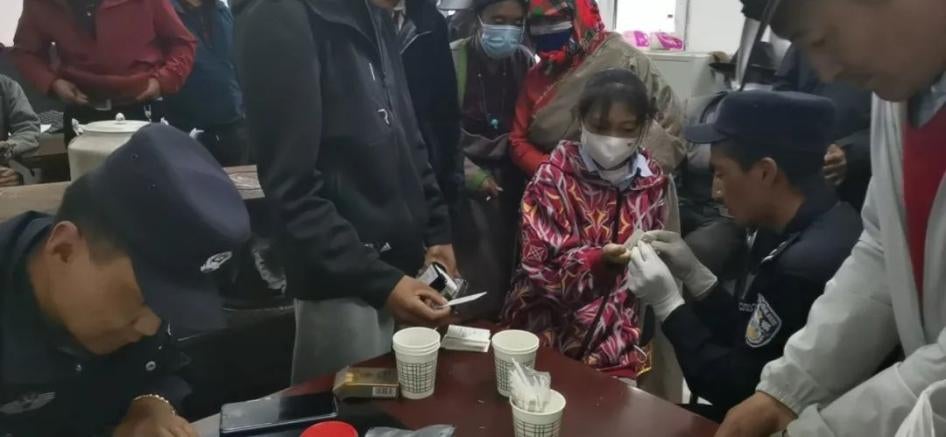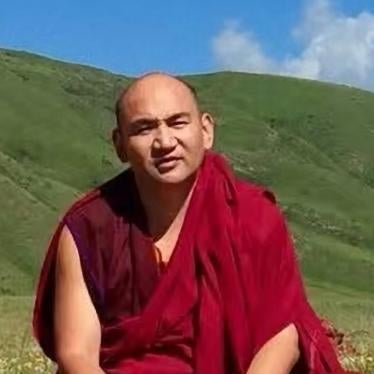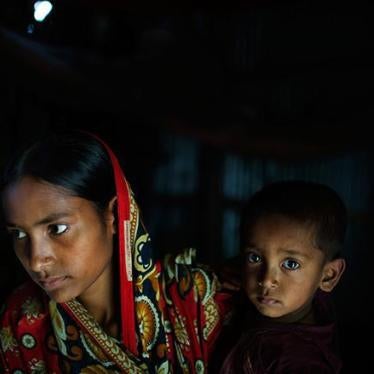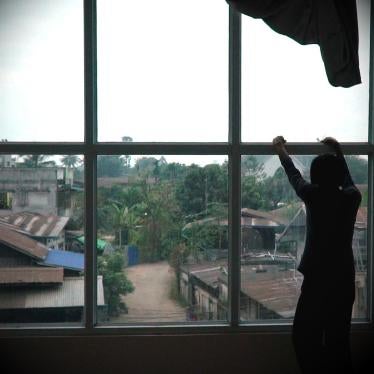(ニューヨーク)ー 中国政府当局は、チベット自治区(TAR)全域の多くの町や村で住民からDNAを採取するなどし、監視活動を大幅に強めている、と本日ヒューマン・ライツ・ウォッチは述べた。
入手可能な情報によれば、住民はDNAの提供を拒否することはできず、警察は犯罪行為があったという信用できる証拠も必要もない。2022年4月のラサ市からのある報告によれば、DNA採取のために幼稚園にいる子どもやその他の地元住民から血液サンプルが組織的に集められていた。青海省のチベットの人びとが住む郷から2020年12月にあったある報告によれば、5歳以上の少年全員からDNAが採取されていた。
「中国政府はこれまでもチベットの人びとを広範に抑圧してきた」とヒューマン・ライツ・ウォッチの中国担当部長ソフィー・リチャードソンは述べた。「今や当局は、監視能力を強化するために、同意なしで文字通り血液を採取している。」
この大規模なDNA採取活動は、チベット高原西部に位置するチベット自治区にある7つの市・地区すべてで行われているもようである。住民がDNA提供を拒否することができること、またはDNA採取の正当な理由となりうる犯罪行為についての信用できる証拠を警察が有することを示す証拠は公には存在しない。ヒューマン・ライツ・ウォッチが調査した複数の報告は、これらの地域で一時滞在者も含めて全住民からDNAが採取されることになっていたのを示している。住民が検体提供を拒否することのできる条件を示す報告はない。
ヒューマン・ライツ・ウォッチは、チベット自治区の7つの県レベルの市・地区の全域にある14の別個の地区(1つの県、2つの郡、2つの町、2つの郷、7つの村)でDNA採取が行われたという報告を確認した。これは、チベット自治区全域で採取が行われている、または行われる予定ということを示している。複数の政府調達関連の文書からは、2019年7月にチベット自治区警察が地域レベルのDNAデータベースの構築について業者から入札を募ったことがわかる。これは当局が自治区全域で採取に取り組む準備をしていたことを裏付けるものである。2019年11月には、チベット自治区の県レベルの行政区画であるニンティ地区の警察も、同地区のDNAデータベースの構築を発表した。
7つの市・地区の1つであるチャムド地区では、DNA採取の目的は「確認の効率を改善し、逃亡者の拘束の一助とすること」と説明された。他の地域の住民も同様に、全体的な犯罪探知のためにDNA採取が必要なのだと言われた。ある公式の報告書は、大規模な採取は「公安機関が様々な不法事件を見つけ、不法分子や犯罪分子を効果的に取り締まる」ために必要なのだとした。
中国国外の研究社らは2020年に、チベット自治区では2013年に大規模なDNA採取が始まったと述べた。この主張は、チベット自治区で2013年に始まった「年度体検(Physicals for All)」という集団健康診断事業についての公式報道に基づいていた。この事業の公式の目的は医療の提供を改善することだが、ヒューマン・ライツ・ウォッチが2017年に入手した公式文書によれば、新疆では、当局はこの事業を利用して12歳から65歳までの住民のDNAを密かに一斉に採取した。ヒューマン・ライツ・ウォッチは、チベット自治区の当局がDNA採取のために同様の事業を利用したことを示す情報は入手していない。
中国の他地域の警察も、2010年代初めから大規模なDNA採取活動を行ってきた。しかし入手可能な証拠によれば、そのような取り組みは移民、前科者、容疑者のほか、治安機関が「要注意人物(focus personnel)」と分類する社会集団など、警察が問題視する一部の人たち、または2017年以降は、中国全域の全男性のうちおよそ8.1パーセントから26.4パーセントのDNAを採取する警察のプログラムの対象者だけに限られてきた。
血液サンプルの提供を強制する場合や、確かな自由意志に基づいたインフォームドコンセントがない場合や、正当な理由のない場合に血液を採取することは、個人のプライバシーや尊厳や身体の完全性を侵害する可能性がある。状況によっては品位を傷つける取り扱いに相当することもある。治安維持のためにある地域全体または住民らのDNA採取を強いることは、必要性又は均衡性で正当化できないという点で重大な人権侵害である。
医療情報の機密性の尊重は、健康権の中心となる原則でもある。国連の「経済的、社会的及び文化的権利に関する委員会(CESCR)」は各国に対し、「医療に関するすべての施設、商品、サービスは…機密性を尊重するように作られなければならない」と提言している。プライバシー権は、医療情報について絶対的な機密性ルールを確立するものではないが、機密性の妨害や侵害については必ず正当性が示されなければならない。採取された情報が、警察やそのデータベースにアクセスできる他の機関と日常的に共有されることが意図されている場合は、正当性が示されているとは言えない。
DNA情報は扱いに非常に注意を要するものであり、同意なしに採取されたり共有されたりすれば様々な人権侵害を助長する可能性がある。政府による強制的な採取や使用は、プライバシーの権利の重大な侵害である。政府によるDNA採取は、許された捜査手段として正当化されることもあるが、プライバシー権へのこの種の干渉は包括的に規制され、適用範囲を狭く限定し、治安に関する正当な目的に対して均衡性がある必要がある。
しかし中国政府によるデータ収集活動においては、犯罪捜査と何らかの関係があるかにかかわらず全員からDNA情報が採取されており、インフォームドコンセントも、DNAサンプル採取の理由の説明も必要とされていないとみられる。
子どものプライバシーは子どもの安全や行動力(agency)や尊厳を確保するために不可欠であり、子どものプライバシーに対するいかなる制限も、合法性、必要性、均衡性の基準を満たす場合にのみ許される。
遺伝情報の収集や処理や使用は、子どものプライバシーを特に高い危険にさらす。DNAには扱いに高度の注意を要する情報が含まれ、それによって子どもやその家族、障がいや重大な健康問題につながりうる遺伝性の健康状態が決定的かつ永久に特定される。このデータの使用・露出は「子どもに悪い結果をもたらす可能性があり、それが将来にわたって影響を与え続ける場合がある」。
当局が、確かな自由意志に基づいたインフォームドコンセントがないまま子どもやその保護者からDNAを集めることや、個人的な健康情報を提供しない選択肢が実質的にはない、または提供を拒否できない教育の場で採取することは、子どものプライバシー権の侵害である。さらに、このデータの使用目的は犯罪探知のためだという当局の公式な説明は、子どもの最善の利益のための正当かつ均衡性のある目的とは考えられない。
村でのDNA採取は、中国政府当局が2022年1月にチベット自治区で行った「三大」運動の一環として報告されている。チベット自治区各地にある7つの地域−–ロダー(ロカ地区)、ギャツァ(ロカ地区)、ネドン(ロカ地区)、チョンゲー(ロカ地区)、チュシュー(ラサ市)、ラサ(ラサ市)、バイ(ニンティ地区)−–からの公式報道は、この運動は「草の根の社会統治体制を強化する」ために現在行われている複数の取り組みの一つだとする。これは、以前は郷と呼ばれる行政拠点にまでしか及んでいなかった警察の存在を村レベルで増やすことを主な手段とする。
三大運動は、正式には「大走訪(大いなる訪問)、大調研(大いなる調査)、大化解(大いなる調停)」として知られ、新たにできた村の警察署や近くの郷にある派出所の警官が各世帯を訪問し、住民の見解を尋ねることが求められる。チベット南部のロダーで三大運動を行う警官は、「村に行き、真実を突き止めるために[各]世帯に入って網羅的に捜査をする」ように命じられた。
「チベットの人びとにとっての真の『三大』とは、こうしたおぞましい人権侵害の即時終了、関係者の捜査、訴追であろう」とリチャードソンは述べた。
更なる詳細は以下をご覧ください:
DNA Collection Drives in Tibet
According to official media reports, drives to collect DNA from the residents of a given area have taken place in region since 2019.
- From May 2019, according to a report on the TAR’s website, police in Chamdo municipality, one of the seven prefecture-level administrations in the TAR, carried out a year-long collection of various types of basic data and information and established a database of fingerprints and DNA samples of the entire population of the municipality.
- In May 2020, police in Ngari Prefecture, TAR, carried out village-level DNA collection drives.
- In June and July 2021, police carried out DNA collection from the residents of Nyima town and Aza town, both in Nagchu municipality, TAR.
- In November 2021, police began a DNA collection drive from the residents of Medog county in Nyingtri prefecture, TAR.
- From December 2021 to late January 2022, police carried out DNA collection from the residents of Geda township in Damshung county, Lhasa municipality; from six villages in four different townships of Sakya county, Shigatse municipality; and from the township of Layu in Chonggye county, Lhokha municipality.
- In April 2022, police in Nyemo county, in Lhasa municipality, began a drive to collect DNA from the residents of Nyemo town, including children attending at least three kindergartens within the town.
The report from Chamdo municipality in May 2019 specifies that DNA was to be collected from the entire population, and notes that police were told “not to miss a [single] village or monastery, and not to miss a [single] household or person.” By May 2019, 3,737 police in Chamdo had collected data from at least 524,500 people in the municipality, 69 percent of the population. As a result, they had assembled “1,500 clues” from the data; these had enabled them to arrest “26 fugitives of various types, especially in the special operation of ‘sweeping gangsters, eliminating evil and fighting against chaos.’”
A police report from Chonggye county in Lhokha municipality, where police were collecting “basic information” and DNA samples between early December 2021 and late January 2022, part of the drive called “the Three Greats” (Da zou fang, da diaoyan, da huajie), said that “no village must be omitted from a township, no household must be omitted from a village, and no person must be omitted from a household.” In April 2022, a report by the Nyima County Public Security Bureau in Nagchu noted that officials had collected DNA from almost all residents except those working outside the county.
Other official reports seen by Human Rights Watch document DNA collection drives in Tibetan areas outside the TAR. Only two of these reports – from the townships of Mentang in Golok prefecture and Dritoe in Yushu municipality, both in Qinghai in 2021 – indicate that DNA was being collected from all residents of those areas. Six other reports from Tibetan-inhabited towns or townships in Golok and Hainan prefectures in Qinghai, and from Bathang County in Sichuan province, describe DNA collection from males only, as in other parts of China.
Several reports indicate that children as young as five have been included in some of the DNA collection drives. In the town of Xia Dawu in Golok prefecture, police announced in December 2020 that DNA had to be collected from all males between 5 and 60, although requirements earlier that year had set the minimum age at 16. Photographs in a report from Qingzheng township in Golok in April 2021 show DNA being taken by police from boys in the first year of primary school.
The reports do not provide evidence that children, or their caregivers, gave consent for their DNA blood samples to be taken. The Qingzheng report, for example, says that local auxiliary police “patiently explained” to the children the reasons for collecting their DNA and “promptly eliminated the confusion and doubts of the collected personnel.”
An April 2022 report on the DNA collection drive in kindergartens in Nyemo county, in Lhasa municipality in the TAR, states that police explained in detail “the necessity and importance of DNA samples collected by the public security organs,” and thus “promptly eliminated the doubts and concerns of the masses and obtained the support and understanding of the collected persons for this work.” In another kindergarten in Nyemo, the report says, police “got the support and understanding of the work from the teachers and students in the school.” There is no suggestion in these reports that parents were involved in the consent process.
In TAR, available evidence suggests that prior to 2019, police DNA collection also focused on certain subsets of the population. For example, in July 2015, police in Lhasa announced the purchase of DNA testing and detection database for forensic purposes at a cost of 10 million yuan (US$1.6 million), probably to assess DNA collected from suspects, and in March 2018, police in a village in Taktse county, Lhasa, collected DNA from all migrant workers in the area, but not apparently from all registered residents. The mass DNA collective drives in TAR since 2019 significantly expand the authorities’ collection of such biodata beyond previous government efforts in the region.
DNA collection from each resident in localities with Tibet is significant not just in terms of concerns about consent or privacy; it represents a further advance in close management of the population by the government. Because it requires contact with and registration of each individual, it allows Chinese authorities to identify, tabulate, and track all people in a given area.
The fact that such collection is selective in other parts of China but widespread in many, and likely, in most areas of the TAR and Xinjiang, shows that the authorities feel an especially urgent need to increase data acquisition and monitoring capacity at the grassroots level in those two regions. Mass DNA collection is a logical extension of prior extensive surveillance and deepening police presence there, in Tibet notably via “The Three Greats” drives and other village-level policing initiatives, key elements of which are detailed below.
The Three Greats’ Drives
DNA collection drives in Tibet coincided with the “Three Greats” drives in some areas. Both involve data collection about every individual within a village.
According to official media reports from Gyatsa county and Bayi town in the TAR, police carrying out the Three Greats drive have to apply a principle known as “one household, one file” or “one household member, one policeman,” meaning that a designated police officer is responsible for compiling information on each household and each person.
Public Security Bureau reports describe the collection of information about individual thinking and opinion as “establishing direct police-people relations” and as “spreading information tentacles.” The authorities say the information is intended to improve service provision, such as advising residents to avoid online fraud or listing elderly people who need assistance.
Almost all reports also state that a primary purpose is identifying disputes that the officials can then resolve (the third of the Three Greats: “Great Mediation”). Since at least 2018 Chinese authorities have banned anyone except government and Communist Party officials from carrying out even informal dispute mediation, an important civil function in Tibet that lamas, village elders, or other locally respected figures had generally conducted earlier.
Security agencies regard local disputes as a potential source of unrest, and in practice, the aim of resolving “disputes” and collecting “opinions and suggestions put forward by the masses” appears to be to identify and suppress popular dissent. A report from Lhodrak county in southern Tibet, for example, specifies that the police must solicit individuals' opinions about “demolitions and relocation.” This move appears to be designed to identify local resistance to relocation.
Several thousand villagers in Lhodrak are being resettled in remote border locations, and some official reports describe intensive, years-long efforts to get residents to agree. Chinese officials take elaborate measures to prevent villagers from returning to their original homes, and officials are required by law to demolish the former houses of relocated villagers to prevent them from returning.
The intensification of police presence at the local level and the practice of household visits is part of an ongoing nationwide drive known as the “Fengqiao” or “Maple Bridge experience,” after a social control experiment from the Maoist era when local residents were encouraged to provide information and support to police. The Fengqiao drive, like the Three Greats, is presented as a form of public service and emphasizes that mediation of local disputes should be carried out only by police and local officials.
As the slogan for this work indicates – “keep small things in the village, keep big things in the village, prevent conflicts from being handed upwards” – the authorities’ objective is to engage local residents in supporting police work by reporting information about others, and to prevent local people from taking their grievances to higher-level authorities and control the spread of dissent to other communities.
Other stated objectives of the current drives are the catch-all “elimination of hidden threats to social stability,” and “strengthening the mapping and management of key persons.” The term “key persons” or “focus personnel” (zhongdian renyuan) refers to individuals or types of individuals arbitrarily deemed a potential threat to stability, and subject to control by Public Security.
A similar drive in the Kandze (Ch.: Ganzi) Tibetan Autonomous Prefecture of Sichuan province has introduced police posts staffed by fulltime auxiliary personnel. These uniformed auxiliaries are also expected to conduct home visits to collect data and mediate disputes and achieve “zero distance from the masses” through constant proximity, both face to face and in village WeChat groups. In Sershul (Ch.: Shiqu) county, part of Kandze prefecture, official media term the village policing drive as “micro police and village police.”
Official reports have emphasized that auxiliaries stationed in these villages as part of this initiative provide public education to counter online fraud. According to researchers with exile monitoring organizations, however, police in Sershul detained 117 Tibetans in 2021 for weeks of extrajudicial re-education after searches of their phones revealed what authorities claim was banned content. Human Rights Watch has confirmed recent exile media reports of the systematic searching of mobile phones for banned text and images by local police in rural areas in Nagchu (Ch.: Naqu) municipality, TAR.
Village Policing
Under the “social management” approach introduced by the former leader Hu Jintao and elaborated by Xi Jinping, authorities have intensified local-level policing, usually in the name of “grassroots governance” or better service provision. In the TAR, the current process began in 2011, when teams of cadres were sent to reside in every village of the region to carry out political education, social services, and other functions.
In May 2012, “grid management” and other technologically-assisted forms of urban neighborhood surveillance and preventive policing were introduced systematically throughout urban neighborhoods (known as “communities” in Chinese) to provide enhanced security management at the block level. In May 2013, all households in the TAR were organized into units known as Advanced Double Liaison Households (Ch.: shuanglianhu), each consisting of 5 to 10 households led by a huzhang or household-head responsible for liaising with the neighborhood or village authorities about political compliance and service needs within each unit.
At this stage, police stations in Tibetan rural areas were located in townships, not villages. This changed in Qinghai province in October 2015, when an announcement appeared in Qinghai province official media that over 5,000 police officers – approximately 10-20 percent of the Qinghai police force – were to be transferred to work in villages, where each would serve for two years. A month later, in November 2015, an additional 4,530 new recruits began training to become “village police” in Qinghai. State media reported that they would carry out work “such as preventive control of social stability, fighting crime, monitoring social media and internet messaging, gathering information and management of the actual population.”
That same month, Qinghai officials announced that pilot projects from Golok Darlak and Xunhua counties to “strengthen building of grassroots stability” would expand to the entire province. The goal was described as “establishment and building of security cells” as part of a “three-dimensional control system for social stability.” This system was part of a call by Zhang Gongrong, head of the Qinghai provincial Politics and Law Committee, to increase “the capacity of grassroots police and village police” to “vigorously eliminate the danger of instability.”
Village police stations started to appear in the TAR by July 2020, when the first Fengqiao police stations were established in 17 of the 20 administrative villages in Chushul, a county near Lhasa, as a pilot scheme. Since then, reports indicate village police stations have been established in other areas of the TAR, including Shigatse and Chamdo. A number of village-level police stations have also been established in the new villages being constructed along Tibet’s southern borders, such as Tsari in Lhuntse county, Nagchu in Drongba county, and Ruomoxin in Gamba county.
The intensification of police presence and activity at the grassroots level in rural areas appears designed to extend the surveillance capacity achieved in urban areas to the communities where the majority of Tibetans still live, which have been subject to wide-ranging state intervention under current development policies. It is part of a broader effort by the authorities to promote “grassroots governance” and “rule of law,” which in fact has involved attacks on civil society groups and village leaders, notably those associated with local opposition to official corruption and damage to the environment, or promotion of Tibetan language.
This approach was confirmed in the 2018-21 “Anti-Gang-Crime” campaign, which targeted social associations and activists as “underworld forces.” That campaign has since been made a regular part of Public Security work at all levels. A report on the work of a team from the Anti-Gang-Crime campaign headquarters for Bayi Qu, the main city in Nyingtri (Ch.: Linzhi) municipality, “going to the grassroots and households for Great Questioning” was the first of four tasks undertaken this year.









